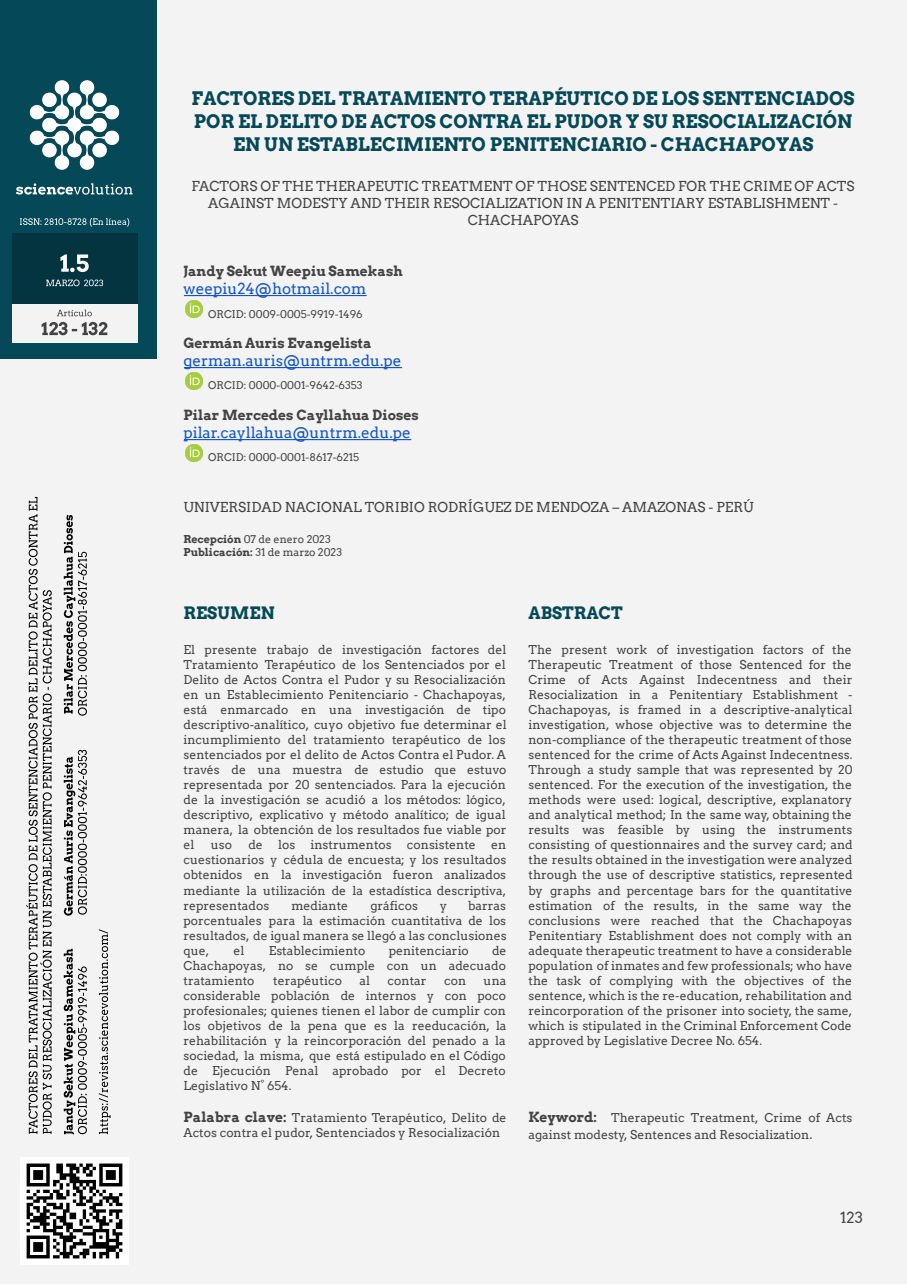Abstract
The present work of investigation factors of the Therapeutic Treatment of those Sentenced for the Crime of Acts Against Indecentness and their Resocialization in a Penitentiary Establishment - Chachapoyas, is framed in a descriptive-analytical investigation, whose objective was to determine the non-compliance of the therapeutic treatment of those sentenced for the crime of Acts Against Indecentness. Through a study sample that was represented by 20 sentenced. For the execution of the investigation, the methods were used: logical, descriptive, explanatory and analytical method; In the same way, obtaining the results was feasible by using the instruments consisting of questionnaires and the survey card; and the results obtained in the investigation were analyzed through the use of descriptive statistics, represented by graphs and percentage bars for the quantitative estimation of the results, in the same way the conclusions were reached that the Chachapoyas Penitentiary Establishment does not comply with an adequate therapeutic treatment to have a considerable population of inmates and few professionals; who have the task of complying with the objectives of the sentence, which is the re-education, rehabilitation and reincorporation of the prisoner into society, the same, which is stipulated in the Criminal Enforcement Code approved by Legislative Decree No. 654.
References
Arauco, M. (2018). Informe Estadístico Penitenciario. Instituto Nacional Penitenciario. https://siep.inpe.gob.pe/Archivos/2018/Informes%20estadisticos/informe_estadistico_enero_2018.pdf
Bagner, A. (12 de abril de 2015). Delito de Actos Contra el Pudor.
Cuba, E. (2017). Reinserción Social de los Internos en los Centros Penitenciarios del Estado Peruano. Perú.
Dzul, M. (s.f.). Diseño No-Experimental. Universidad Autónoma del Estado de Hidalgo. https://www.uaeh.edu.mx/docencia/VI_Presentaciones/licenciatura_en_mercadotecnia/fundamentos_de_metodologia_investigacion/PRES38.pdf
Fernandéz, D. (2014). El Fin Constitucional de la Reeducación y Reinserción Social ¿Un Derecho Fundamental o una Orientación Política Hacia el Legislador Español
https://dialnet.unirioja.es/servlet/articulo?codigo=5229718
Hernández, R., et al. (2014). Metodología de la investigación. México: mexicana.
Hurtado, (2016). Sistema Penitenciario. Indaga https://indaga.minjus.gob.pe/sites/default/files/publicaciones01_CONTENIDO_0.pdf
Hurtado, J. (2016). Situación del Sistema Penitenciario en el Perú. INDAGA.
https://www.inei.gob.pe/media/criminalidad/Exposiciones/Gustavo_Adolfo.pdf
Mandela, N. (s.f). Las Reglas Mínimas de las Naciones Unidas para el Tratamiento de los Reclusos. https://www.unodc.org/documents/justice-and-prison-reform/Brochure_on_the_The_UN_Standard_Minimum_the_Nelson_Mandela_Rules-S.pdf
Marco, M. P. (2015). Agresores sexuales de menores: aspectos criminológicos y tratamiento jurídico penal. Universidad de Castilla la Mancha, Toledo.
https://ruidera.uclm.es/xmlui/handle/10578/7171
Morales, M. (2016). La incidencia de la gestión privada de los establecimientos penitenciarios en la resocialización de los sentenciados a pena privativa de libertad efectiva desde una óptica del penal San Joaquín De Quillabamba. Universidad Andina del Cusco
https://hdl.handle.net/20.500.12557/357
Ponciano, J. (2016). Problemas intracarcelarios y la resocialización de internos sentenciados por robo agravado en centro penitenciario de Potracancha. Universidad de Huánuco, Huánuco.
Sanders, M. (2013). El sistema penitenciario peruano. Universidad Católica de Santa María, Arequipa. https://bibliotecadigital.oducal.com/Record/ir-UCSM-5006

This work is licensed under a Creative Commons Attribution-NonCommercial-NoDerivatives 4.0 International License.
Copyright (c) 2023 http://revista.sciencevolution.com/

